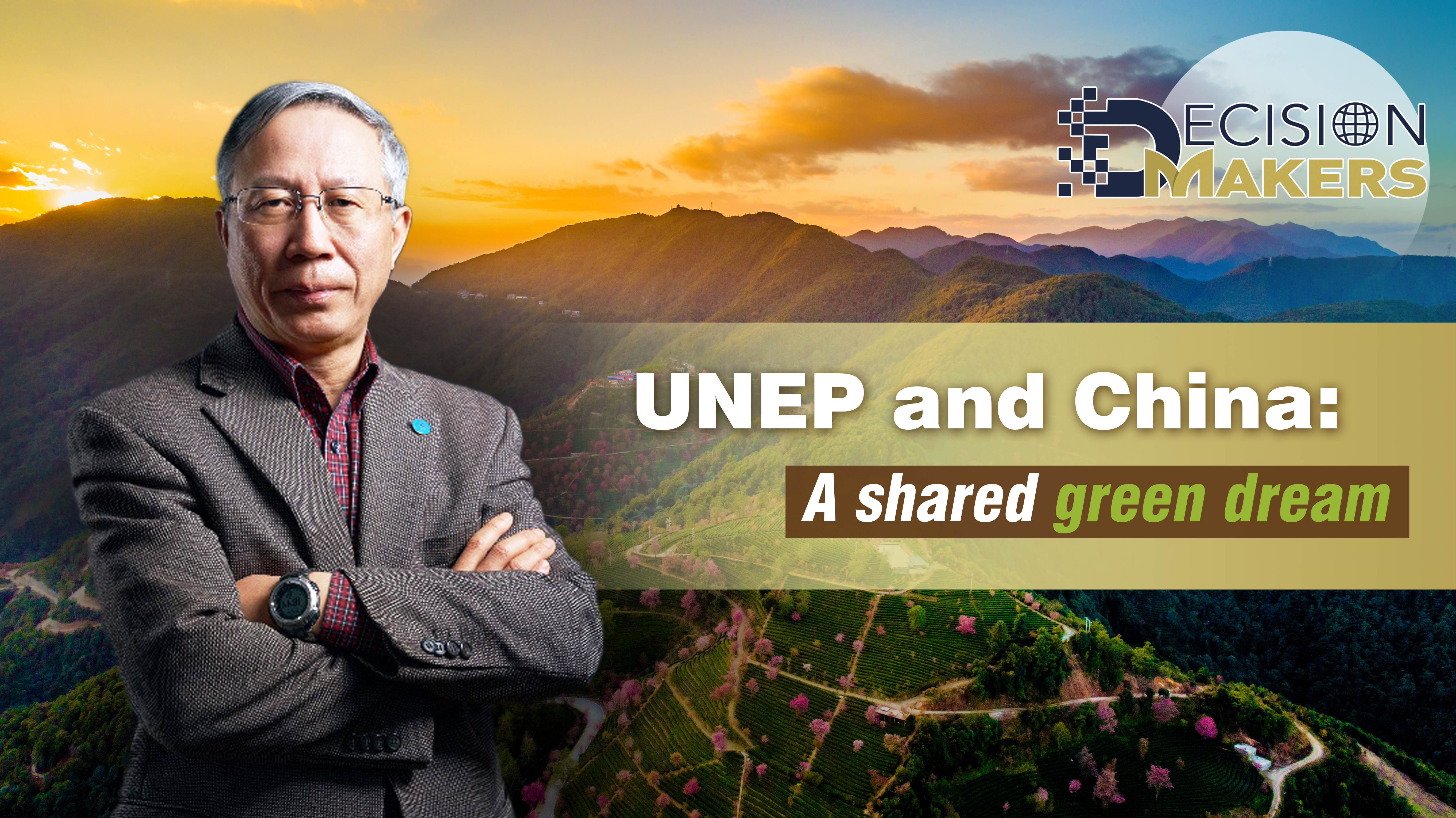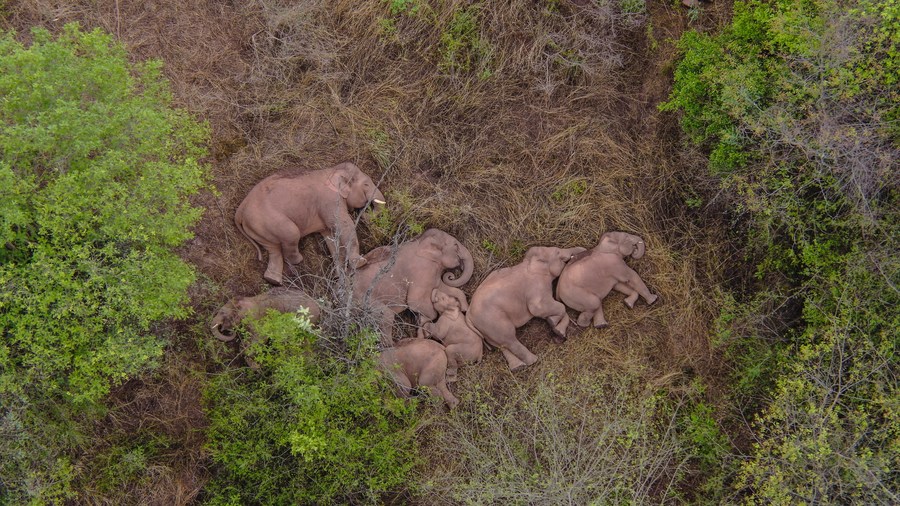
Editor's note: Decision Makers is a global platform for decision-makers to share their insights on events shaping today's world. Tu Ruihe is the Head of the United Nations Environment Programme (UNEP) China Office, and UNEP Representative for China. He is also the Co-chair of United Nations Sustainable Development Cooperation Framework (UNSDCF) Planet Result Group in China. The article reflects the author's opinions and not necessarily the views of CGTN.
The United Nations Environment Programme (UNEP) was established on the basis of recommendation by the 1972 United Nations Conference on the Environment in Stockholm and upon the resolution of the United Nations General Assembly (UNGA) in 1972. The Stockholm Conference, one of several earliest UN conferences attended by a Chinese government delegation after the restoration of the country's lawful seat in the UN in 1971, also marked the start of a partnership between the UNEP and China. Shortly after the conference, the Chinese government set up its initial environmental protection agency – the State Council Environmental Protection Leadership Group Office – and held the first national conference on environment protection.
Soon after the UNEP's official establishment in 1973 in Nairobi, the Chinese government entered into a formal partnership with the Organization by setting up its permanent mission to it. In 2003, UNEP opened its office in Beijing, UNEP's first country office.
Since its establishment, UNEP has maintained a sound and close partnership with China. Lasting mutual support as well as diverse and expanding pragmatic cooperation between the two sides has led to rewarding results.
China's effective environmental protection at the domestic level is not only a premise for its own sustainable development and the improvement of its environmental quality and public wellbeing, but also a significant contribution to the global green cause. UNEP, together with the cooperation mechanisms and action initiatives launched and led by it, is an indispensable channel for China to follow-up the latest progress, trends and developments of the global environmental endeavors, and to draw on good policies, practices and experience of other countries.
Since the 1992 Rio de Janeiro Earth Summit, China's role in regional and global environmental protection efforts has transformed from a participant, follower and contributor to a leader, adding even more positivity to its image as a responsible major country.
Looking forward, China is expected to strengthen international cooperation and multilateralism. UNEP will remain a strategic partner in further strengthening China's role in international environmental governance, defending the interests of the developing world, building a community with a shared future for mankind and promoting ecological progress. Platforms and mechanisms put in place by UNEP are an irreplaceable channel for China to share with other developing countries its good practices and experiences in this regard.
A new opportunity for UNEP-China cooperation
Such cooperation, in recent years, has been constantly expanding to cover broad areas including biodiversity.
At a time when China celebrates the 50th anniversary of the restoration of its lawful seat in the UN and is about to host the Fifteenth Session of the Conference of the Parties to the Convention on Biological Diversity (COP 15), UNEP looks forward to furthering its pragmatic cooperation with China within the framework of the Convention on Biological Diversity.

Aerial photo shows wild Asian elephants in Jinning District of Kunming, southwest China's Yunnan Province, June 7, 2021. /Xinhua
Aerial photo shows wild Asian elephants in Jinning District of Kunming, southwest China's Yunnan Province, June 7, 2021. /Xinhua
At present, the Chinese government, UNEP and the Secretariat of the Convention are making significant joint effort to prepare for the first part of the COP 15 (the second part will convene in April and May 2022.)
On the protection of biological diversity, China has many good practices to share with the international community, and can offer the "China approach" to eco-system restoration.
This approach includes a strong political leadership, a forward-looking concept underpinned by the vision of ecological civilization, the marriage of a clear medium- and long-term strategy with phased objectives, an ever-improving environmental law system and consistent enforcement, practical and effective policies and implementation mechanisms, supervision and accountability, the mobilization of all social sectors, public support and participation, and media and public supervision.
In 2019, the UNGA declared 2021–2030 the "UN Decade on Ecosystem Restoration." Under this call to action jointly initiated by the UNEP and the UN Food and Agriculture Organization, eco-system restoration will be one of the major areas for cooperation between China and the UNEP.
Over the past decades, China has carried out ecological restoration and desert control projects on a monumental scale. Such efforts have been proven both a great success and a source of good practices and experience that China can share with the rest of the world through UNEP's platforms.
A landmark conference for the world to tackle major environmental challenges
Sustainable social and economic development, a long-term pursuit of humanity, is facing a dire threat from ecological degradation and the loss of biodiversity. The outbreak of COVID-19 across the world and the more frequent occurrence of extreme climate events lately are nature's wake-up calls to humans that have dealt an unprecedentedly crushing blow to society and economy. This further highlights the fact that biodiversity and ecosystem health are closely linked with the wellbeing of the human society.
The COP 10 held in 2010 set 20 "Aichi Biodiversity Targets" to be by the year 2020. However, none of these targets have been achieved in full and only six have been partially met. One of the most important reasons for the non-delivery is the lack of funding and means of implementation.
The COP 15 will develop a post-2020 Global Biodiversity Framework, setting the 2030 biodiversity targets and making decisions on issues regarding future biodiversity protection including capacity building, fundraising and the implementation of the Framework in the hope of accelerating the fulfillment of the 2050 Vision of "Living in Harmony with Nature."
As one of the most biologically diverse countries in the world, China has been putting enormous efforts over the years into protecting biodiversity and has achieved remarkable results. The challenges ahead, however, remain daunting.
The COP 15 will be a landmark conference in the history of the Convention and for both China and the rest of the international community. UNEP will continue to work together with the Secretariat of the Convention, the host country and other stakeholders to facilitate the formulation of an ambitious yet practical framework and ensure the success of the conference.
(If you want to contribute and have specific expertise, please contact us at opinions@cgtn.com.)

